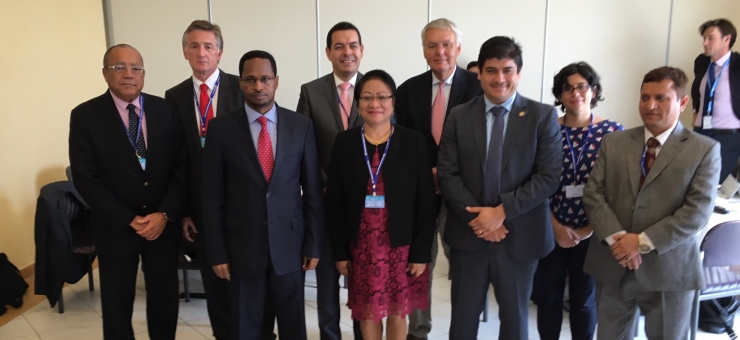High-level tripartite dialogue on climate change and labour

Rising temperatures are cutting labour productivity and worsening workers’ health - making heat one of the biggest social and economic impacts of climate change, especially in the most vulnerable countries. Millions of workers are being exposed to excessive heat causing health problems and accidental injuries which could result in lost productivity amounting to trillions of dollars a year.
On the 8th of June, UNI Global Union and ITUC were invited to speak at the Ministerial Working session during the International Labour Conference. The issue was addressed by the Ministers of Labour of the Philippines, Costa Rica and Ethiopia, a high-level representative of the Labour Ministry in Nepal, with the participation of the Ministers of Honduras and the Maldives, as well as high-level representatives the workers’ group and the employers’ group during a tripartite dialogue co-hosted by the UNDP Climate Vulnerable Forum and the ILO at the Palais des Nations.
Philip Jennings, General Secretary of UNI Global Union said: “The science is clear: heat stress is dangerous. 7,000 workers will pay with their lives preparing for the Qatar World Cup, partly due to extreme heat. 1 billion people are being exposed to extreme heat in tropical and subtropical regions. With global warming, a lot of these people might need to move away from places which are becoming inhabitable. The cost of labour productivity loss may exceed 2 trillion US dollars a year by 2030.”
“Climate change is a union business. There is not a single union that doesn’t have a health and safety policy. Unions are part of the solution.”
“Employers from multinational companies also need to take their responsibilities and ensure that workers’ lives are being protected throughout the supply chains. The Bangladesh Accord shows that we can change the world, it is a game changer in global supply chains”, he added.
Rosalinda Dimipalis- Baldoz, Minister of Labour of the Philippines (CVF Chair), said: “The Philippines are experiencing temperature records and an annual average of 20 typhoons. The impacts of climate change and heat are enormous. Those most at risk are engaged in heavy work such as agriculture, construction and manufacturing. The most vulnerable workers are being exposed to extreme poverty. After the typhoon Haiyan, we launched a programme to improve minimum wage and social security.”
“Decent work should not be a casualty of climate change but a driver for climate action and social protection.”
Carlos Alvarado, Minister of Labour of Costa Rica explained the situation in his country: “Research found a major increase in kidney diseases due to dehydration and extreme heat sometimes requiring a transplant or dialysis. This was reported to the Ministry of Health, which prepared a new decree on occupational health and safety to better protect workers with appropriate clothing, shade and hydration on the workplace. It became a presidential decree in July 2015. This is also important for the economy as heat has a major impact on labour productivity. It is now clear to us that there is very important link between climate change, health and labour.”
Abdulfatah Abdullahi, Minister of Labour and Social Affairs of Ethiopia (incoming CVF Chair) gave the closing remarks: “ This is a cross-cutting issue which touches upon the implementation of the Sustainable Development Goals. We now need to move from facts to policy-making and action. We are pleased to see the ILO Guidelines for a just transition and environmentally sustainable economies. Special attention should be paid to the Occupational Safety and Health section of these guidelines. This also requires a tripartite response from governments, employers and employees. All three have a key role to play. The most vulnerable countries will also need some capacity-building support from the ILO. And we would like to encourage all the different international agencies to work together on a coordinated approach to help us address this major issue on labour productivity and health”.
As countries make plans to implement the Sustainable Development Goals and the Paris Climate Agreement, effective joint policy responses were discussed to address the significant social, economic, and health impacts and further progress will need to be made including in the UNFCCC and ILO policy frameworks.
On the 28th of April, as part of International Workers’ Memorial Day, UNI Global Union had participated to an inter-agency UN event with the International Labour Organization (ILO), the United Nations Development Programme (UNDP), the International Organization of Employers (IOE), the International Trade Union Confederation (ITUC), the World Health Organization (WHO), the International Organization for Migration (IOM) and the NGO network ACT Alliance to address this issue. The Issue paper on climate change and labour was launched on that day to better inform the policy process. The issue triggered a lot of the debate in global media and was covered by mainstream media outlets such as the AFP, Reuters, Le Monde and the Guardian; in total 96 press articles were published on the subject.

